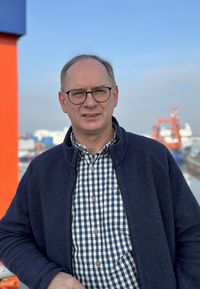Contact person

Dr. Thomas Badewien
Marine Sensors (M.Sc.)
Facts and Figures
- Degree: Master of Science
- Duration: 3 semesters
- Start of studies: annually in the summer semester, if necessary bridging semester in the previous winter semester
- Language: German and English
- No admission restriction, but special admission requirements
The master's degree in marine sensors offers a research-oriented qualification in the development, optimization and analysis of various types of sensors and measurement methods for marine issues. In the courses, functional principles of different sensor types, mathematical-scientific measurement methods and information-technological models for data acquisition and storage are dealt with. Special emphasis is placed on scientific work. Here, the students should meet international scientists at an early stage. Furthermore, there are excellent opportunities to specialize in certain measurement methods and to carry out research projects independently.

![[Translate to English:]](/f/5/_processed_/3/2/csm_ICBM-Logo-transparent-_91fe1c6774.png)